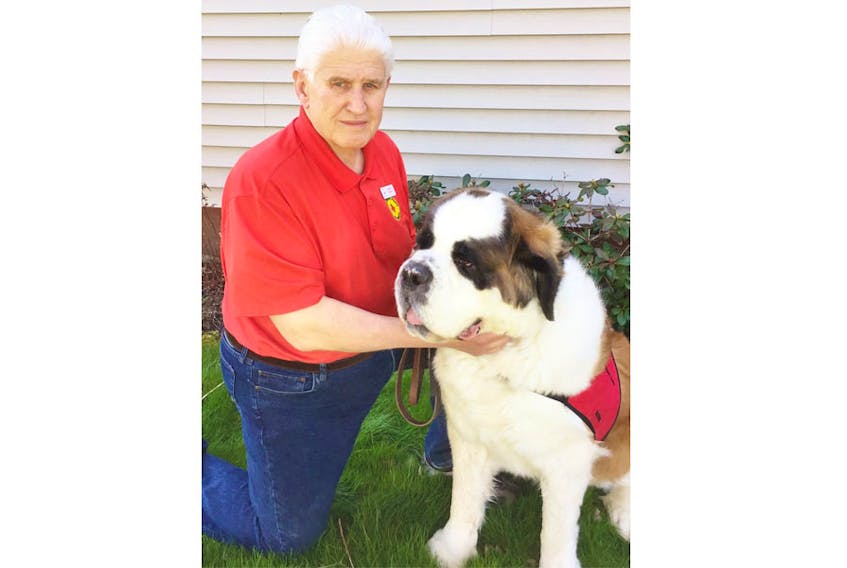What humans want, according to Mark Grant, Halifax team leader of Therapeutic Paws of Canada (TPoC), “is no judgement and unconditional love.”
That’s where Watson and his friends come in. A Saint Bernard, the 175-pound, caring canine volunteers with his handler Grant by visiting locations within 100 km of Halifax Regional Municipality (HRM). They are part of the Volunteer Pet Therapy Visitation Program.
Watson’s specialty is providing what the TPoC.ca website calls “a special kind of love” to the people he visits. Grant and Watson visit nursing homes, high schools at exam time, universities, police and emergency workplaces, institutions dealing with tragedy, hospitals, corporate headquarters and more.
Asked what draws people to Watson and the other certified therapy dogs, Grant says he hears the same thing again and again from people across locations who pause for a pet.
“They’ll say ‘You just made my day’ or that they feel ‘happier and more relaxed’ . . . and in a better position to go on with their day.”
For Grant, people may seek out pets for simple comfort and companionship, emotional support, stress relief or a welcome distraction from a stressful environment.
At the high school level, Grant says it is not uncommon for students to cuddle with Watson, often sprawling out on the floor with the dog. In elementary schools, children may be encouraged to read to the dogs. In a seniors’ residence, time with the pet allows for contact with a warm body, and Grant adds, the experience may evoke happy memories. Regular visits to 9-1-1 dispatchers and other high-stress workplaces are equally effective and rewarding for Grant.

How it works
Therapeutic Paws of Canada was founded in 2002, Grant said, and has more than 600 volunteers across the country. The TPoC.ca website notes the primary mission of the 100 per cent volunteer based organization is to “provide animal resources for human beings in school and hospitals.”
There are two teams in Nova Scotia, one in Sydney and one in Halifax. Grant says the Halifax team currently has more than 60 dogs and handlers. Visitations usually involve three dogs and respective handlers who will stay between 15 and 60 minutes, depending on the situation and location.
Visits are free of charge and any institution may request a visit, although Grant advises that setting up a visit or series of visits may take a couple of months.
Every team is responsible for raising funds. In Halifax, handlers pay a one-time fee, and Grant adds that donations from the private sector are key to sustainability.
Volunteers
There are volunteer opportunities with TPoC. Grant says the Halifax-based organization is “bursting at the seams . . . some days my phone and e-mail doesn’t stop with requests for visits and to join the organization.”
The organization is always looking for dogs and their handlers to join TPoC, although Grant says this process is thorough and takes time, typically six to eight weeks, to assure the pet and handler are ready for the public.
Grant is quick to point out that pet ownership is not required of volunteers. Grant says they are grateful for volunteers who prepare and support the visiting and training spaces or offer professional services.
Visit TPOC.ca to find out more or call Mark Grant at 902-499 -4242.









